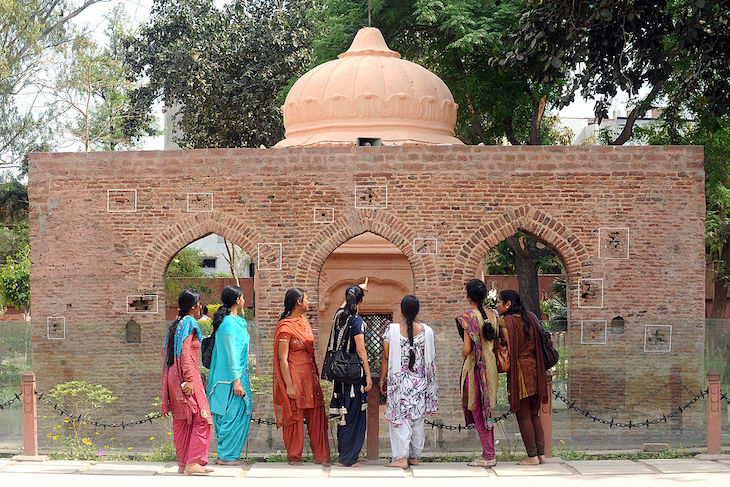Growing up I remember my late grandfather, a former commissioned officer in the British Indian Army, being fixated by re-runs of Richard Attenborough’s award-winning film Gandhi. One scene stood out. In the film Attenborough immortalised an event that Churchill referred to as ‘monstrous’, and David Cameron ‘a deeply shameful event in British history’ – the Jallianwala Bagh.
On 13 April 1919 15-20,000 civilians (including some peaceful protestors) in a walled garden (or bagh) in Amritsar marking the festival of Vaisakhi, were mercilessly gunned down without warning by British troops. According to official figures, 379 men, women and children were killed and over a thousand injured, with 1,650 rounds of ammunition continuously fired for ten minutes. Brigadier-general Reginald Dyer, who ordered the attack, perversely saw himself as an enforcer of martial law against a burgeoning revolutionary movement (especially in the Punjab and Bengal) which the Empire feared would lead to mutiny. But rather than repressing Indian nationalists, and regardless of Dyer’s justification, ‘I shot to save the British Raj’, Jallianwala Bagh became a seminal moment for India’s independence struggle and marked the beginning of the end of colonial rule.
For the 1.3 million Indian men (many of them Punjabi Sikhs, Hindus and Muslims) who fought for Britain in the Great War, and without whom there would have been no victory on the Western front, the massacre was an unforgivable act of betrayal.
Although the House of Lords failed to condemn ‘The Butcher of Amritsar’ at the time, successive British governments of all hues have been united in their condemnation of Dyer’s brutality. Moreover, Prime Ministers like Blair and Cameron have also expressed shame and regret – but stopped short of apologising on behalf of the country. Calls for Britain to apologise come along every so often, and have intensified in the run up to the massacre’s centenary this year. Politicians of various persuasions have done so via an Early Day Motion, an ‘Amritsar Massacre: Centenary’ debate in the House of Lords, and in the case of Sadiq Khan who visited Amritsar in 2017, a suggestion, that on the 100th anniversary Britain should give ‘ the people of Amritsar and India the closure they need through a formal apology.’ Notably, the Foreign Secretary Jeremy Hunt is ‘reflecting’ on whether it’s time to say sorry.
But shouldn’t memorialisation and education about the darker aspects of colonialism (along with the good) take precedent? In any case, who would the apology be for, and why should it be given by the government now? I fear if we go down the Trudeau route of apologising for past atrocities, Indians should also request apologies from Afghans, Iranians, and the Portuguese (for the Goan inquisition) too.
In the vein of educating rather than apologising, the centenary of Amritsar is being marked with the publication of several important books. Political journalist Anita Anand has written The Patient Assassin: A True Tale of Massacre, Revenge and the Raj revealing the remarkable story of Sikh revolutionary Udham Singh, a boy who survived the massacre vowing to extract revenge on those responsible. While Dr Kim Wagner, an academic from Queen Mary University of London, has written Amritsar 1919: An Empire of Fear and the Making of the Amritsar Massacre. Wagner suggests it’s problematic to view Amritsar through the Churchillian prism of an ‘unprecedented’ incident in ‘sinister isolation’ – which the House of Lords’ apology was entirely framed around.
Wagner told me:
‘The problem is that Churchill deliberately sought to explain away the massacre as a singular event, perpetrated by a rogue officer, suggesting that this violence in no way reflected on the true nature of either the Raj or of the Empire… Yet anyone familiar with Churchill’s own record in this regard, or with nineteenth century colonial campaigns, or the brutal conflicts of decolonisation, would recognise that what happened at Amritsar was not in fact an aberration and that Dyer was not somehow unique. To quote Churchill in connection with the Amritsar Massacre does not constitute a reckoning with the past as much as a continuation of colonial policy – and such an apology is unlikely to be well-received in India today.’
For me personally, an apology is in many ways problematic and it is far more important that we in the UK have an open and honest debate about the legacies of Empire, which goes beyond moralistic and over-simplistic notions of either ‘good’ or ‘bad’ (or ‘pride’ or ‘shame’), and that a genuinely nuanced approach to history is taught in schools and elsewhere.’
In contrast, the British Indian author Saurav Dutt, who has penned the historical novel Garden of Bullets: Massacre at Jallianwala Bagh has taken an alternative view. He said, ‘an apology not only allows for atonement but a sincere starting point to integrate a mature, sincere and realistic examination of history of our curriculum, one that is not afraid to balance the achievements with the darker chapters of the past.’ Despite their differences in opinion, both Wagner and Dutt agree on the importance of education.
With that in mind, I will be attending a forthcoming book launch at the National Army Museum where British Sikh historians Amandeep Singh Madra and Parmjit Singh will be discussing their latest book – Eyewitnesses at Amritsar: A Visual History of the 1919 Jallianwala Bagh Massacre. The first-hand accounts include those of British and Indian residents of Amritsar, civil and military governors, and Dyer himself. The co-authors want to encourage debate on the subject, especially outside the Indian community – which makes sense. Many in my circle (including fellow journalists) are unaware of the tragedy that transpired in Amritsar a hundred years ago – let alone grasp its long-lasting legacy. Although the government has pledged to consider an apology – surely the wider public deserves to learn first about what happened in the first place.






Comments